Molecular characterization of dendritic cell-derived exosomes. Selective accumulation of the heat shock protein hsc73
- PMID: 10545503
- PMCID: PMC2151184
- DOI: 10.1083/jcb.147.3.599
Molecular characterization of dendritic cell-derived exosomes. Selective accumulation of the heat shock protein hsc73
Abstract
Exosomes are membrane vesicles secreted by hematopoietic cells upon fusion of late multivesicular endosomes with the plasma membrane. Dendritic cell (DC)-derived exosomes induce potent antitumor immune responses in mice, resulting in the regression of established tumors (Zitvogel, L., A. Regnault, A. Lozier, J. Wolfers, C. Flament, D. Tenza, P. Ricciardi-Castagnoli, G. Raposo, and S. Amigorena. 1998. Nat. Med. 4:594-600). To unravel the molecular basis of exosome-induced immune stimulation, we now analyze the regulation of their production during DC maturation and characterize extensively their protein composition by peptide mass mapping. Exosomes contain several cytosolic proteins (including annexin II, heat shock cognate protein hsc73, and heteromeric G protein Gi2alpha), as well as different integral or peripherally associated membrane proteins (major histocompatibility complex class II, Mac-1 integrin, CD9, milk fat globule-EGF-factor VIII [MFG-E8]). MFG-E8, the major exosomal component, binds integrins expressed by DCs and macrophages, suggesting that it may be involved in exosome targeting to these professional antigen-presenting cells. Another exosome component is hsc73, a cytosolic heat shock protein (hsp) also present in DC endocytic compartments. hsc73 was shown to induce antitumor immune responses in vivo, and therefore could be involved in the exosome's potent antitumor effects. Finally, exosome production is downregulated upon DC maturation, indicating that in vivo, exosomes are produced by immature DCs in peripheral tissues. Thus, DC-derived exosomes accumulate a defined subset of cellular proteins reflecting their endosomal biogenesis and accounting for their biological function.
Figures
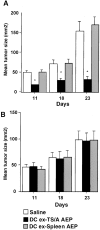
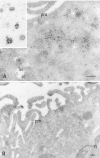
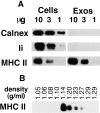
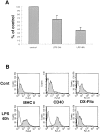
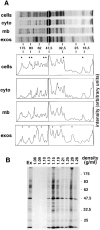
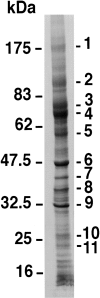
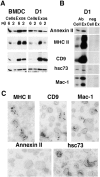


References
-
- Albert M.L., Sauter B., Bhardwaj N. Dendritic cells acquire antigen from apoptotic cells and induce class I-restricted CTLs. Nature. 1998;392:86–89. - PubMed
-
- Amigorena S., Drake J.R., Webster P., Mellman I. Transient accumulation of new class II MHC molecules in a novel endocytic compartment in B lymphocytes. Nature. 1994;369:113–120. - PubMed
-
- Andersen M.H., Berglund L., Rasmussen J.T., Petersen T.E. Bovine PAS-6/7 binds alpha v beta 5 integrins and anionic phospholipids through two domains. Biochemistry. 1997;36:5441–5446. - PubMed
-
- Aoki N., Kishi M., Taniguchi Y., Adachi T., Nakamura R., Matsuda T. Molecular cloning of glycoprotein antigens MGP57/53 recognized by monoclonal antibodies raised against bovine milk fat globule membrane. Biochim. Biophys. Acta. 1995;1245:385–391. - PubMed
Publication types
MeSH terms
Substances
LinkOut - more resources
Full Text Sources
Other Literature Sources
Research Materials
Miscellaneous

